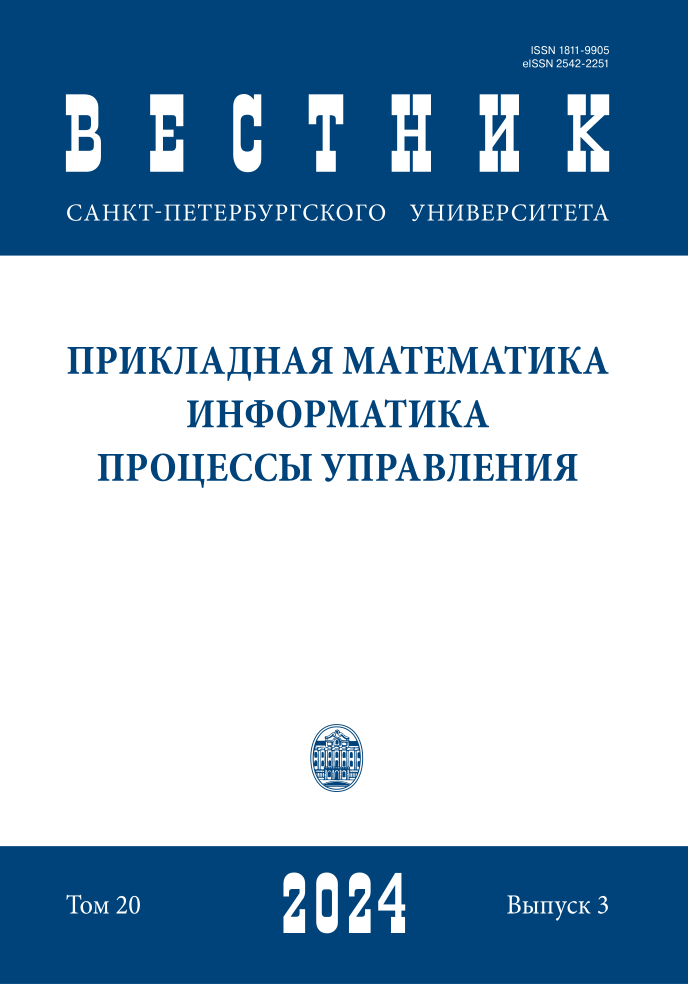Competition for agents’ opinions in small dynamic systems with limited control
DOI:
https://doi.org/10.21638/spbu10.2024.308Abstract
This paper explores a competitive opinion dynamic system representing a social network evolving over time. The agents compare their own opinions with the average ones and form new opinions. There are players who control agents’ opinions in a social network, and their aims are to make opinions in the society closer to the desired levels over a finite time horizon by minimizing their costs. The feature of this model is that players can influence agents in a limited number of time moments. We show how players can choose the moments of influence from Pareto optimal set on numerical examples. The results of numerical simulations are provided in the work.
Keywords:
opinion competition game, Nash equilibrium, opinion dynamics, social network
Downloads
References
References
Degroot M. H. Reaching a consensus. Journal of the American Statistical Assocition, 1974, vol. 69, iss. 345, pp. 118–121.
Friedkin N. E., Johnsen E. C. Social influence and opinions. Journal of Mathematical Sociology, 1990, vol. 15, pp. 193–206.
Deffuant G., Neau D., Amblard F., Weisbuch G. Mixing beliefs among interacting agents. Advances in Complex Systems, 2000, vol. 3, no. 1–4, pp. 87–98.
Gao J., Parilina E. M. Average-oriented opinion dynamics with the last moment of observation. Control Processes and Stability, 2021, vol. 8, no. 1, pp. 505–509.
Gao J., Parilina E. M. Opinion control problem with average-oriented opinion dynamics and limited observation moments. Contributions to Game Theory and Management, 2021, vol. 14, pp. 103–112.
Gao J., Parilina E. M. Opinion dynamics in multiagent systems with optimal choice of opinion verification moments. Doklady Mathematics, 2023, vol. 108, suppl. 1, pp. S75–S85. https://doi.org/10.1134/S1064562423600732
Gao J., Parilina E. M. Optimal control in a multiagent opinion dynamic system. Contributions to Game Theory and Management, 2022, vol. 15, pp. 51–59.
Lang N., Zha Q., Wang L. Competitive targeted marketing in social networks with switching topology: seed selection and consensus shaping. Information Fusion, 2023, vol. 95, pp. 355–371.
Goyal S., Kearns M. Competitive contagion in networks. Proceedings of the Forty-Fourth Annual ACM Symposium on Theory of Computing, 2012, pp. 759–774.
Carnes T., Nagarajan C., Wild S. M., van Zuylen A. Maximizing influence in a competitive social network: a follower' s perspective. Proceedings of the Ninth International Conference on Electronic Commerce, 2007, pp. 351–360.
Mazalov V. V., Parilina E. M. Game of competition for opinion with two centers of influence. Mathematical Optimization Theory and Operations Research, 2019, pp. 673–684.
Goyal M., Manjunath D. Opinion control competition in a social network. 2020 International Conference on COMmunication Systems & NETworkS (COMSNETS), 2020, pp. 306–313.
Liu Y., Liu J., Wu K. Cost-effective competition on social networks: a multi-objective optimization perspective. Information Sciences, 2023, vol. 620, pp. 31–46.
He G., Ruan H., Wu Y., Liu J. Opinion dynamics with competitive relationship and switching topologies. IEEE Access, 2021, vol. 9, pp. 3016–3025.
Mandel A., Venel X. Dynamic competition over social networks. European Journal of Operational Research, 2020, vol. 280, no. 2, pp. 597–608.
Yu J., Wang Y., Li J., Shen H., Cheng X. Analysis of competitive information dissemination in social network based on evolutionary game model. 2012 Second International Conference on Cloud and Green Computing, 2012, pp. 748–753.
Goyal M., Chatterjee D., Karamchandani N., Manjunath D. Maintaining ferment. 2019 IEEE 58th Conference on Decision and Control (CDC), 2019, pp. 5217–5222.
Gao J. Two-player opinion control game with limited observation moments. Control Processes and Stability, 2022, vol. 9, no. 1, pp. 464–468.
Sedakov A. A., Zhen M. Opinion dynamics game in a social network with two influence nodes. Vestnik of Saint Petersburg University. Applied Mathematics. Computer Science. Control Processes, 2019, vol. 15, iss. 1, pp. 118–125. https://doi.org/10.21638/11701/spbu10.2019.109
Kareeva Y., Sedakov A. A., Zhen M. Influence in social networks with stubborn agents: from competition to bargaining. Applied Mathematics and Computation, 2023, vol. 444, pp. 127790. https://doi.org/10.1016/j.amc.2022.127790
Jiang H., Mazalov V. V., Gao H., Wang C. Opinion dynamics control in a social network with a communication structure. Dynamic Games and Applications, 2023, vol. 13, no. 1, pp. 412–434. https://doi.org/10.1007/s13235-021-00406-y
Haurie A., Krawczyk J. B., Zaccour G. Games and dynamic games. Singapore, World Scientific Publishing Company, 2012, 488 p.
Downloads
Published
How to Cite
Issue
Section
License
Articles of "Vestnik of Saint Petersburg University. Applied Mathematics. Computer Science. Control Processes" are open access distributed under the terms of the License Agreement with Saint Petersburg State University, which permits to the authors unrestricted distribution and self-archiving free of charge.





